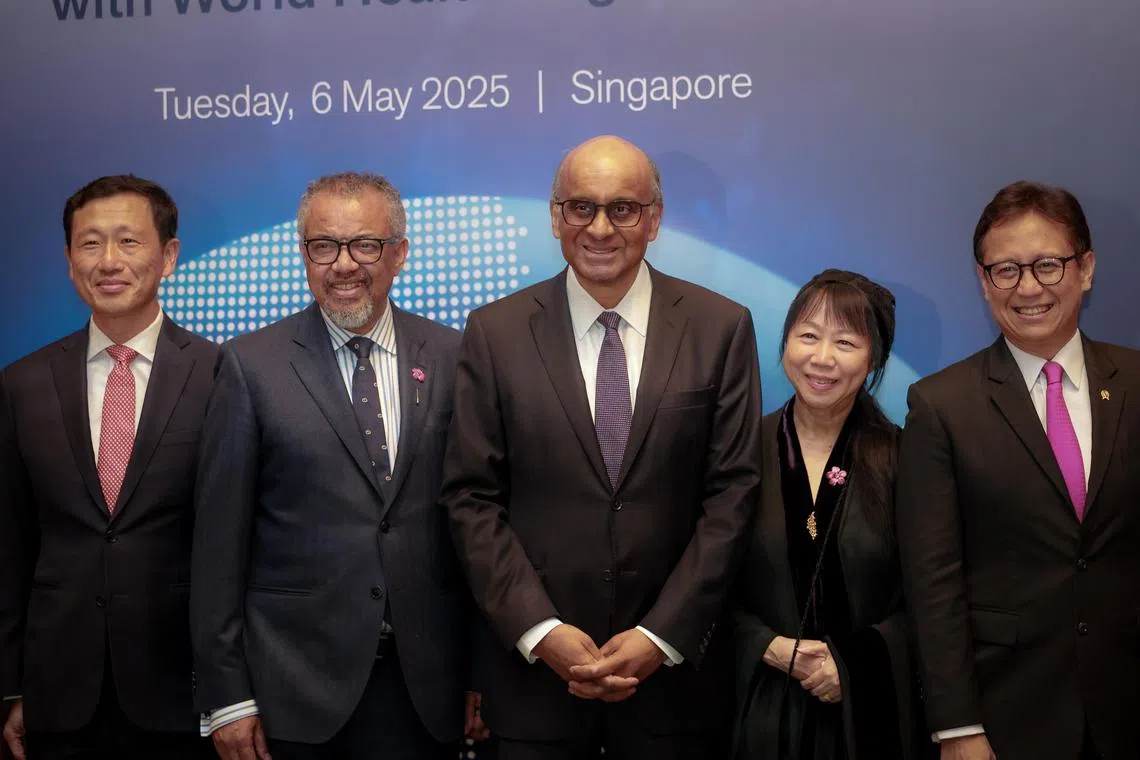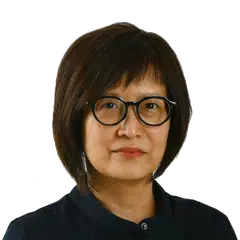World must fight complacency, wishful thinking, insularity before next pandemic: President Tharman
Sign up now: Get ST's newsletters delivered to your inbox

President Tharman Shanmugaratnam speaking at the Temasek Foundation networking dinner on May 6.
ST PHOTO: GAVIN FOO
SINGAPORE – Barely five years after the Covid-19 pandemic first hit, the world is at risk of forgetting its lessons, and the greatest challenge now is complacency, wishful thinking and insularity, said President Tharman Shanmugaratnam.
The world has to counter that challenge creatively and avoid further polarisation, he said.
“We have to do so through arrangements that appeal to nations’ sense of self-preservation, and which recognise the practical reality that we can prevent and prepare for the next pandemic only through a major step-up in internationally coordinated investments and actions.”
Speaking at a high-level networking dinner hosted by the Temasek Foundation on May 6, Mr Tharman said scientists have made clear that the next major pandemic is a matter of when, not if, and it could come in 10 years or next year. There is thus much work ahead.
The world has to first reclaim lost ground and rebuild local healthcare systems, as the Covid-19 pandemic had set them back by more than just the first few years of that event. It has to continue to invest at much higher levels in the global health ecosystem, especially in pandemic prevention and preparedness, as well as strengthen international and regional cooperation, Mr Tharman said.
Held at the Pan Pacific Singapore hotel, the dinner coincides with the Philanthropy Asia Summit 2025, which is taking place from May 5 to 7. It brings together leaders from philanthropy, government and the private sector to explore opportunities for advancing health and well-being in Asia.
Among the guest speakers was Dr Tedros Adhanom Ghebreyesus, the director-general of the World Health Organisation (WHO).
Congratulating Dr Tedros on reaching the agreement on the WHO’s pandemic treaty on April 16, Mr Tharman said the pact lays the foundation for the world to address major gaps in the global health ecosystem, and particularly the huge inequities in access to vaccines and therapeutics that were seen during the Covid-19 pandemic.
In research and development, much work needs to be done downstream to make vaccines and treatments affordable and accessible, he said. This includes developing vaccines that are needle-free to address the challenge of the need for skilled manpower to administer them, and which do not need to be kept below freezing point.
Developing a globally distributed manufacturing ecosystem for vaccines and treatments is also very important, he added.
Mr Tharman said the WHO has been working to seed and grow collaboration in these and other areas.
“Regional disease surveillance and control networks have also become crucial pillars of our collective defence,” he said.

President Tharman Shanmugaratnam and his spouse, Ms Jane Ittogi, with (from left) Health Minister Ong Ye Kung, WHO director-general Tedros Adhanom Ghebreyesus and Indonesian Health Minister Budi Gunadi Sadikin at the Temasek Foundation Networking Dinner on May 6.
ST PHOTO: GAVIN FOO
For instance, the Africa Centres for Disease Control and Prevention coordinates surveillance of 55 countries serving 1.3 billion people, while the European Centre for Disease Prevention and Control strengthens preparedness in the European Union.
In Singapore, the National Environment Agency’s Environmental Health Institute, designated as a WHO Collaborating Centre for Reference and Research of Arbovirus and their Associated Vectors, supports regional capacity and capability for the surveillance and control of arboviral diseases, which are spread by arthropods such as insects and mites.
Asean, too, is stepping up in safeguarding regional health security.
“The gradual pullback in spending on international development and global health is now a new reality for multilateral institutions like the WHO, as well as for the other plurilateral and non-governmental bodies that comprise the whole health ecosystem,” said Mr Tharman.
A resilient financing ecosystem for global health needs to be developed within these constraints, he said. “We cannot wait for the most ideal multilateral architecture to be rebuilt, and we are not even sure what it would look like.
“We will therefore have to work with broad coalitions of the willing.”
These are broad coalitions of governments, together with plurilateral bodies like the Coalition For Epidemic Preparedness Innovations, for instance, philanthropic organisations and leading businesses, working together with multilateral organisations like the WHO.

World Health Organisation director-general Tedros Adhanom Ghebreyesus (left) chatting with President Tharman Shanmugaratnam at the Temasek Foundation networking dinner on May 6.
ST PHOTO: GAVIN FOO
Multilateral institutions can help mobilise these coalitions, and work jointly with them to scale up efforts to prevent and prepare for the next pandemic, Mr Tharman said.
At the dinner, Dr Tedros said Singapore has come a long way since it gained independence in 1965 – the year he was born – and now enjoys one of the world’s longest life expectancies, has one of the world’s most advanced health systems, and is one of the world’s most advanced economies.
He said countries invest billions in protecting themselves from attacks by other countries or terrorist groups, but relatively little on protecting themselves from an attack by an invisible enemy. However, health security is economic security, and both must be balanced.
A lot of the WHO’s work goes unseen, including the unglamorous technical work of bringing global experts together to distil the latest scientific evidence into guidance, and helping countries to strengthen their health systems, Dr Tedros said. But the WHO cannot do it alone.
It works closely with a huge range of partners, including many philanthropists, who are making a huge impact on global health.
Temasek Foundation executive director and chief executive Ng Boon Heong said that the foundation, as a non-state actor of the WHO, has pledged up to US$10 million (S$13 million) to co-curate programmes and projects to improve health outcomes in Asia in the areas of pandemic preparedness, maternal and child health, digital health, and science and innovation.
The WHO works with non-state actors such as non-governmental organisations, philanthropic groups and academic institutions to advance global health.
Joyce Teo is a senior health correspondent at The Straits Times, and the host of the ST Health Check podcast.



